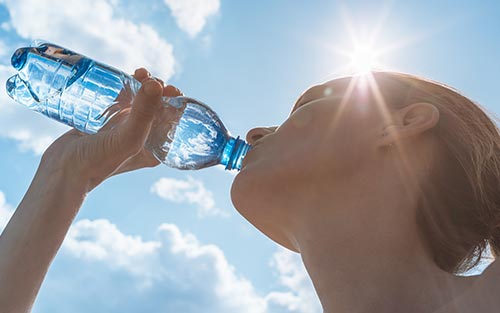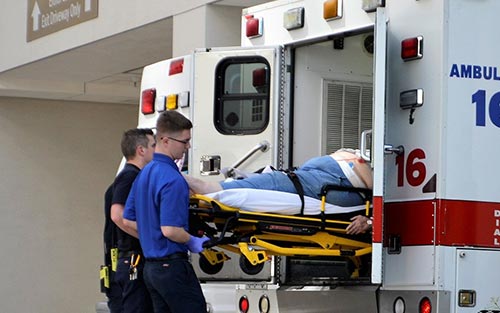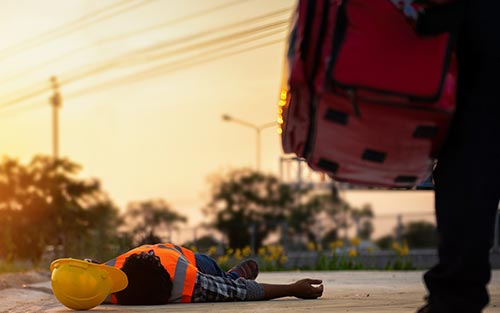Avoid heat exhaustion, heatstroke, or hospitalization during periods of extreme heat. By knowing how to keep your body temperature regulated and hydrated, you can make it through the hottest months with your health and wellness intact.

yourfootpalace.com gathered information about the warning signs of heat-related problems, when to seek medical attention, and how to prevent associated illnesses, injuries, and death.
Effects of Hot Weather on The Body
It doesn’t have to be summer to experience a period of extreme heat. ready.gov/heat defines extreme heat as a period with high heat and humidity with temperatures above 90 degrees for at least two or more days.
The longer you are exposed to excessive heat, the more serious the effects on the body can get. As your body temperature rises, you may begin to experience one or a combination of the following:
• Heavy sweating
• Clammy skin
• Muscle pains
• Cramps
• Headache
• Exhaustion
• Tiredness
• Dehydration
• Diarrhea
• Fast but weak pulse
One condition that extreme heat can induce is called heat syncope – a temporary reduction of blood flow to the brain. This can occur after substantial fluid loss from sweating and a drop in blood pressure.
People 65 and older, children under 2 years old, and those with underlying or chronic diseases (heart disease, obesity, high blood pressure) are at the highest risk of developing these symptoms.
Our bodies have evolved to operate at 98.6°F or 37°C, and it is generally accepted that the threshold for a fever is 1°C or 1.8°F above normal. As your core temperature rises well beyond its ideal temperature, beware of the following signs of heatstroke:
• Nausea may cause you to vomit
• Diarrhea can suddenly set in
• You may experience palpitations
• You may also experience numbness or tingling of your hands and feet
• Confusion
• Loss of consciousness
• Seizures
Heatstroke can quickly turn deadly if not treated immediately. The above symptoms can happen with little to no warning, and if you or someone you know is experiencing them, call 911 for emergency assistance. Follow their instructions until help arrives.

Heatwave Safety
According to the Centers for Disease Control (CDC), more than 600 people in the United States are killed by extreme heat every year. The following will help you control your body temperature and stay cool more efficiently:
• Drink plenty of fluids but avoid alcoholic and caffeinated beverages and those with elevated sugar contents
• Eat frequent light meals heavy on fruits and vegetables
• Wear light-colored loose-fitting clothing
• When outside, find shade
• Wear a hat that covers your ears, neck, and face
• Locate air-conditioned places to go (malls, libraries, community centers, or stay home)
• Never leave an animal, child, or adult inside a vehicle on a warm or hot day
• Avoid high-energy activities
• If you smoke, quit
When working in hot weather:
• Drink 5 to 7 ounces of fluids every 15 to 20 minutes
• Work within your limitations and work at an even pace
• Take frequent breaks in shaded or air-conditioned locations
• Use sunscreen and wear a hat to avoid getting a sunburn
• Avoid direct sun whenever possible

Strategies to keep your home cool during extreme heat:
• Weather-strip or have your doors and windows resealed
• Use or install attic fans to remove hot air
• Use thick drapes or shades to cover your windows
• Use reflective material, like foil, in your windows to repel heat
• Have a thermographic inspection performed to determine where you may be losing air
• Replace or install insulation where your home is losing air
Another way to aid your body during a heatwave is to lower the temperature of your bedroom. Sleeping in a room kept between 60 and 68°F can maximize your sleep and improve your bodily functions.
Anxiety and Heat Intolerance
For those acutely sensitive to heat, they may display intense sweating or elevated levels of anxiety during a heatwave or throughout the summer months. Heat edema (swollen feet and ankles) are also more common during these periods.
An intelligent way to fight anxiety, heat intolerance, and heat edema is to pamper yourself by scheduling a spa day. It should include an Epsom salt soak, a reflexology massage, and cold aromatherapy.

Read more about the benefits of Epsom salt soaks, reflexology, and cold aromatherapy at yourfootpalace.com/beat-the-athens-heat-and-avoid-swollen-feet-with-massage/
Health and Wellness During Hot Weather
In this article, you discovered warning signs of heat-related problems, which symptoms should prompt you to seek medical attention, and how to prevent illness, injury, and death from excessive heat.
Prevent heat exhaustion, heatstroke, and potential death by paying attention to the signs that your body is overheating and no longer capable of cooling itself down.
Exposing yourself to hot weather without taking responsible precautions to prevent illness and injury could become life-threatening and land you in the hospital. Or worse.
Sources:
theweathernetwork.com/news/articles/five-awful-ways-extreme-heat-affects-the-human-body/51464
energy.gov/energysaver/thermographic-inspections
newhealthcenter.org/tips-for-beating-the-summer-heat/
cdc.gov/disasters/extremeheat/index.html
(706) 521-5290
(678) 963-5958
To view the original version on Foot Palace, visit: https://www.yourfootpalace.com/hot-weather-tips/
No comments:
Post a Comment
Note: Only a member of this blog may post a comment.